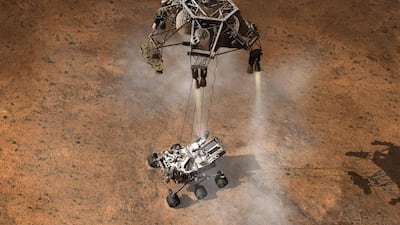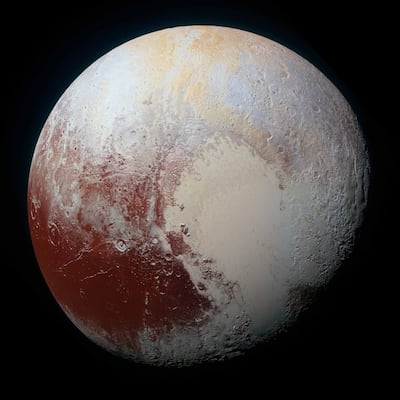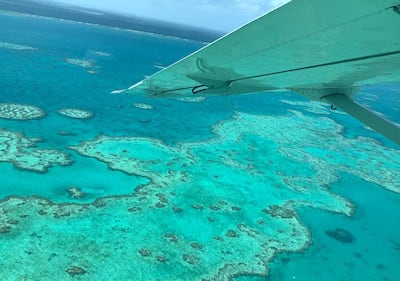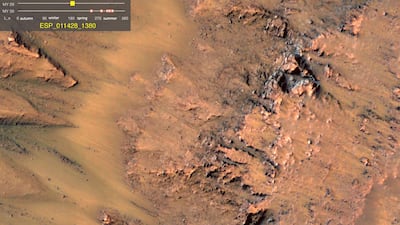Ramadan 2020, in the Islamic year 1441, will always be remembered for one thing: Covid-19. But momentous events have always occurred during the holy month down the years.
As part of a series delving into Ramadan over recent decades, starting in 1950, we look back over the last 70 years at some of the headlines from previous Ramadans, with an emphasis on the positive, of news that shows the strength and creativity of the human spirit.
2011 (1432) July 31 – August 29
Is there life on Mars? That was the question posed by Nasa's Mars Reconnaissance Orbiter as it circled the Red Planet at the start of the decade.
Launched in August 2005, the unmanned craft observed the planet’s slopes and crater walls during the Martian seasons.
It found creeping dark fingers on the landscape that extended during the spring and summer but faded as winter approached.
Water had been discovered on Mars in previous missions but as ice at the northern polar cap. The planet’s low temperature meant that any surface water would be permanently frozen.
On August 4, 2011, an announcement from Nasa suggested another possibility, that evidence of flowing water had been discovered for the first time.
Scientists theorised the water was below the surface and flowed during the warmer months, even though these also have temperatures well below freezing.
To remain liquid, it would have to be extremely salty – “more like a syrup,” according to one expert.
The presence of flowing water greatly increased the possibility of life on Mars or the possibility it could sustain it.
The orbiter continues to circle Mars, relaying data from other craft on the planet’s surface.
It is now one of six operating space craft circling Mars, and will be joined next year by the UAE's Hope mission, which will further expand our knowledge of the planet's weather and atmosphere.
2012 (1433) July 19 to August 18
We remember the summer Ramadan for the London Olympics, which took place between July 27 and August 12.
During that time, Turkish adventurer Erden Eruç completed his own personal race and became the first person to circle the Earth using only human power, including bicycles and boats. Finishing on July 21, it took him just over five years.
This Ramadan was also notable for "seven minutes of terror." That was the dramatic title given to an attempt to put the Curiosity lander on the surface of Mars.
An audacious and untested technique was proposed, which involved suspending the lander under a “sky crane” that would slow the final descent using rocket thrusters.
At the last minute, the sky crane would detach and fly away to prevent damage to Curiosity, the final act of a complex series of manoeuvres, any one of which could end the $2.5 billion mission.
The “seven minutes of terror” referred to the time between entering Mar’s atmosphere and the final touchdown. The time lag in communications to Earth meant that scientists would not know if the mission had succeeded for nearly a quarter of an hour.
In the end, all was well. Curiosity landed on August 5, 2012 and remains operational.
It will be joined next year by Perseverance, another rover that will land using the same technique, in the best Hollywood tradition as "Seven Minutes of Terror 2."
2015 (1436) June 17 – July 16
The space theme of Ramadan during the past 10 years continued with an achievement from the New Horizon deep space probe.
Launched in 2005, the craft finally reached its destination on July 14, 2012, when it completed a fly-by of Pluto at an altitude of 12,442 kilometres and a distance of around four billion miles from Earth.
It took until October 2016 for New Horizon to send back all the data it gathered and the result was our first glimpse of the distant dwarf planet and a series of spectacular images of Pluto and its mysterious five satellite moons.
2018 (1439) May 16 – June 14
We remember the Ramadan of 2018 for two events that were celebrated at the time but perhaps did not end as expected.
The first was the wedding, on May 19, of Prince Harry and Meghan Markle at St George’s Chapel in Windsor Castle.
The marriage of a prince of the British Royal family to an African-American actress attracted huge international attention, with a live audience of 27 million in the UK and 29 million in the United States.
The ceremony was notable for the presence of numerous celebrity friends of the couple and a 14-minute sermon by bishop Michael Curry described as “electrifying.”
What was hailed at the time as landmark for race relations ended with the couple and their son withdrawing from royal life to self imposed exile in California, the result of what they said is intrusion into their private lives.
Later that month, the world watched open-mouthed again as the President of the United States, Donald Trump, shook the hands of his country’s sworn enemy, Kim Jong-un, the leader of North Korea.
The historic meeting took place in Singapore on June 12, with a statement agreeing to new peaceful relations and an end to nuclear weapons on the Korean peninsula.
The summit was followed last year by a meeting between the two leaders on the border of North and South Korea that made President Trump the first American president to step on North Korean soil.
It is fair to say the progress since has been limited at best. Negotiations last took place in October, with North Korea warning of “terrible” events if it did not get a better deal, and the US posting a $5 million reward for North Korean hackers it claimed were launching cyber attacks.
2020 (1441) began April 23
This year's Ramadan will certainly be remembered throughout history, with Covid-19 forcing families to stay home with tens of thousands dead and millions infected.
Despite the global crisis, progress has been made against another disease, malaria, which claims about 400,000 lives and is estimated to cost African economies $12 billion every year.
On May 4, it was announced that scientists in Kenya and the UK had discovered a microbe that completely prevents mosquitoes that spread malaria from contracting the disease in first place.
The bug, Microsporidia MB, was found in mosquitoes on the shores of Lake Victoria, none of whom harboured the malarial parasite.
At present around five per cent of mosquitoes have Microsporidia MB but deliberately raising this to 40 per cent, possible through infecting males in laboratories, could hugely reduce malaria in humans.
A development was also made in the fight against climate change – specifically the bleaching of coral reefs, which is caused by excess carbon dioxide warming oceans.
On May 13, scientists in Australia working on the Great Barrier Reef revealed they had cloned algae in a laboratory that can live in warmer seas.
Algae have a complex relationship with coral. They live inside coral polyps and nourish their host by photosynthesising waste into food.
When the water becomes too warm, corals expel algae, a process that turns the coral white but also leaves it to starve.
Breeding these algae and releasing them into the wild holds out the possibility of slowing the decline in coral reefs worldwide and a happier legacy of this Ramadan.
Mercer, the investment consulting arm of US services company Marsh & McLennan, expects its wealth division to at least double its assets under management (AUM) in the Middle East as wealth in the region continues to grow despite economic headwinds, a company official said.
Mercer Wealth, which globally has $160 billion in AUM, plans to boost its AUM in the region to $2-$3bn in the next 2-3 years from the present $1bn, said Yasir AbuShaban, a Dubai-based principal with Mercer Wealth.
“Within the next two to three years, we are looking at reaching $2 to $3 billion as a conservative estimate and we do see an opportunity to do so,” said Mr AbuShaban.
Mercer does not directly make investments, but allocates clients’ money they have discretion to, to professional asset managers. They also provide advice to clients.
“We have buying power. We can negotiate on their (client’s) behalf with asset managers to provide them lower fees than they otherwise would have to get on their own,” he added.
Mercer Wealth’s clients include sovereign wealth funds, family offices, and insurance companies among others.
From its office in Dubai, Mercer also looks after Africa, India and Turkey, where they also see opportunity for growth.
Wealth creation in Middle East and Africa (MEA) grew 8.5 per cent to $8.1 trillion last year from $7.5tn in 2015, higher than last year’s global average of 6 per cent and the second-highest growth in a region after Asia-Pacific which grew 9.9 per cent, according to consultancy Boston Consulting Group (BCG). In the region, where wealth grew just 1.9 per cent in 2015 compared with 2014, a pickup in oil prices has helped in wealth generation.
BCG is forecasting MEA wealth will rise to $12tn by 2021, growing at an annual average of 8 per cent.
Drivers of wealth generation in the region will be split evenly between new wealth creation and growth of performance of existing assets, according to BCG.
Another general trend in the region is clients’ looking for a comprehensive approach to investing, according to Mr AbuShaban.
“Institutional investors or some of the families are seeing a slowdown in the available capital they have to invest and in that sense they are looking at optimizing the way they manage their portfolios and making sure they are not investing haphazardly and different parts of their investment are working together,” said Mr AbuShaban.
Some clients also have a higher appetite for risk, given the low interest-rate environment that does not provide enough yield for some institutional investors. These clients are keen to invest in illiquid assets, such as private equity and infrastructure.
“What we have seen is a desire for higher returns in what has been a low-return environment specifically in various fixed income or bonds,” he said.
“In this environment, we have seen a de facto increase in the risk that clients are taking in things like illiquid investments, private equity investments, infrastructure and private debt, those kind of investments were higher illiquidity results in incrementally higher returns.”
The Abu Dhabi Investment Authority, one of the largest sovereign wealth funds, said in its 2016 report that has gradually increased its exposure in direct private equity and private credit transactions, mainly in Asian markets and especially in China and India. The authority’s private equity department focused on structured equities owing to “their defensive characteristics.”
The%20specs
%3Cp%3E%3Cstrong%3EEngine%3A%20%3C%2Fstrong%3E6.5-litre%20V12%3Cbr%3E%3Cstrong%3EPower%3A%20%3C%2Fstrong%3E725hp%20at%207%2C750rpm%3Cbr%3E%3Cstrong%3ETorque%3A%20%3C%2Fstrong%3E716Nm%20at%206%2C250rpm%3Cbr%3E%3Cstrong%3ETransmission%3A%20%3C%2Fstrong%3E8-speed%20dual-clutch%20auto%3Cbr%3E%3Cstrong%3EOn%20sale%3A%20%3C%2Fstrong%3EQ4%202023%3Cbr%3E%3Cstrong%3EPrice%3A%20%3C%2Fstrong%3EFrom%20Dh1%2C650%2C000%3C%2Fp%3E%0A
Dhadak
Director: Shashank Khaitan
Starring: Janhvi Kapoor, Ishaan Khattar, Ashutosh Rana
Stars: 3
Last 10 NBA champions
2017: Golden State bt Cleveland 4-1
2016: Cleveland bt Golden State 4-3
2015: Golden State bt Cleveland 4-2
2014: San Antonio bt Miami 4-1
2013: Miami bt San Antonio 4-3
2012: Miami bt Oklahoma City 4-1
2011: Dallas bt Miami 4-2
2010: Los Angeles Lakers bt Boston 4-3
2009: Los Angeles Lakers bt Orlando 4-1
2008: Boston bt Los Angeles Lakers 4-2
Civil%20War
%3Cp%3E%3Cstrong%3EDirector%3A%3C%2Fstrong%3E%20Alex%20Garland%C2%A0%3C%2Fp%3E%0A%3Cp%3E%3Cstrong%3EStarring%3A%3C%2Fstrong%3E%20Kirsten%20Dunst%2C%20Cailee%20Spaeny%2C%20Wagner%20Moura%2C%20Nick%20Offerman%3C%2Fp%3E%0A%3Cp%3E%3Cstrong%3ERating%3A%3C%2Fstrong%3E%204%2F5%3C%2Fp%3E%0A
What the law says
Micro-retirement is not a recognised concept or employment status under Federal Decree Law No. 33 of 2021 on the Regulation of Labour Relations (as amended) (UAE Labour Law). As such, it reflects a voluntary work-life balance practice, rather than a recognised legal employment category, according to Dilini Loku, senior associate for law firm Gateley Middle East.
“Some companies may offer formal sabbatical policies or career break programmes; however, beyond such arrangements, there is no automatic right or statutory entitlement to extended breaks,” she explains.
“Any leave taken beyond statutory entitlements, such as annual leave, is typically regarded as unpaid leave in accordance with Article 33 of the UAE Labour Law. While employees may legally take unpaid leave, such requests are subject to the employer’s discretion and require approval.”
If an employee resigns to pursue micro-retirement, the employment contract is terminated, and the employer is under no legal obligation to rehire the employee in the future unless specific contractual agreements are in place (such as return-to-work arrangements), which are generally uncommon, Ms Loku adds.
The%20specs%3A%20Taycan%20Turbo%20GT
%3Cp%3E%3Cstrong%3EEngine%3A%20%3C%2Fstrong%3EDual%20synchronous%20electric%20motors%0D%3Cbr%3E%3Cstrong%3EPower%3A%20%3C%2Fstrong%3E1%2C108hp%0D%3Cbr%3E%3Cstrong%3ETorque%3A%20%3C%2Fstrong%3E1%2C340Nm%0D%3Cbr%3E%3Cstrong%3ETransmission%3A%20%3C%2Fstrong%3ESingle-speed%20automatic%20(front%20axle)%3B%20two-speed%20transmission%20(rear%20axle)%0D%3Cbr%3E%3Cstrong%3ETouring%20range%3A%20%3C%2Fstrong%3E488-560km%0D%3Cbr%3E%3Cstrong%3EPrice%3A%20%3C%2Fstrong%3EFrom%20Dh928%2C400%0D%3Cbr%3E%3Cstrong%3EOn%20sale%3A%20%3C%2Fstrong%3EOrders%20open%3C%2Fp%3E%0A
FIGHT%20CARD
%3Cp%3EAnthony%20Joshua%20v%20Otto%20Wallin%2C%2012%20rounds%2C%20heavyweight%3C%2Fp%3E%0A%3Cp%3EDeontay%20Wilder%20v%20Joseph%20Parker%2C%2012%20rounds%2C%20heavyweight%3C%2Fp%3E%0A%3Cp%3EDmitry%20Bivol%20v%20Lyndon%20Arthur%2C%2012%20rounds%2C%20light%20heavyweight%3C%2Fp%3E%0A%3Cp%3EDaniel%20Dubois%20v%20Jarrell%20Miller%2C%2012%20rounds%2C%20heavyweight%3C%2Fp%3E%0A%3Cp%3EFilip%20Hrgovic%20v%20Mark%20de%20Mori%2C%2012%20rounds%2C%20heavyweight%C2%A0%3C%2Fp%3E%0A%3Cp%3EArslanbek%20Makhmudov%20v%20Agit%20Kabayel%2C%2012%20rounds%2C%20heavyweight%C2%A0%3C%2Fp%3E%0A%3Cp%3EFrank%20Sanchez%20v%20Junior%20Fa%2C%2012%20rounds%2C%20heavyweight%C2%A0%3C%2Fp%3E%0A%3Cp%3EJai%20Opetaia%20v%20Ellis%20Zorro%2C%2012%20rounds%2C%20cruiserweight%3C%2Fp%3E%0A
Lexus LX700h specs
Engine: 3.4-litre twin-turbo V6 plus supplementary electric motor
Power: 464hp at 5,200rpm
Torque: 790Nm from 2,000-3,600rpm
Transmission: 10-speed auto
Fuel consumption: 11.7L/100km
On sale: Now
Price: From Dh590,000
Teenage%20Mutant%20Ninja%20Turtles%3A%20Shredder's%20Revenge
%3Cp%3E%3Cstrong%3EDeveloper%3A%20%3C%2Fstrong%3ETribute%20Games%3Cbr%3E%3Cstrong%3EPublisher%3A%3C%2Fstrong%3E%20Dotemu%3Cbr%3E%3Cstrong%3EConsoles%3A%20%3C%2Fstrong%3ENintendo%20Switch%2C%20PlayStation%204%26amp%3B5%2C%20PC%20and%20Xbox%20One%3Cbr%3E%3Cstrong%3ERating%3A%3C%2Fstrong%3E%204%2F5%3C%2Fp%3E%0A
The specs
Engine: 2.0-litre 4cyl turbo
Power: 261hp at 5,500rpm
Torque: 405Nm at 1,750-3,500rpm
Transmission: 9-speed auto
Fuel consumption: 6.9L/100km
On sale: Now
Price: From Dh117,059
Three tips from La Perle's performers
1 The kind of water athletes drink is important. Gwilym Hooson, a 28-year-old British performer who is currently recovering from knee surgery, found that out when the company was still in Studio City, training for 12 hours a day. “The physio team was like: ‘Why is everyone getting cramps?’ And then they realised we had to add salt and sugar to the water,” he says.
2 A little chocolate is a good thing. “It’s emergency energy,” says Craig Paul Smith, La Perle’s head coach and former Cirque du Soleil performer, gesturing to an almost-empty open box of mini chocolate bars on his desk backstage.
3 Take chances, says Young, who has worked all over the world, including most recently at Dragone’s show in China. “Every time we go out of our comfort zone, we learn a lot about ourselves,” she says.
List of alleged parties
- May 15 2020: Boris Johnson is said to have attended a Downing Street pizza party
- 27 Nov 2020: PM gives speech at leaving do for his staff
- Dec 10 2020: Staff party held by then-education secretary Gavin Williamson
- Dec 13 2020: Mr Johnson and his then-fiancee Carrie Symonds throw a flat party
- Dec 14 2020: Shaun Bailey holds staff party at Conservative Party headquarters
- Dec 15 2020: PM takes part in a staff quiz
- Dec 18 2020: Downing Street Christmas party
Gulf rugby
Who’s won what so far in 2018/19
Western Clubs Champions League: Bahrain
Dubai Rugby Sevens: Dubai Hurricanes
West Asia Premiership: Bahrain
What’s left
UAE Conference
March 22, play-offs:
Dubai Hurricanes II v Al Ain Amblers, Jebel Ali Dragons II v Dubai Tigers
March 29, final
UAE Premiership
March 22, play-offs:
Dubai Exiles v Jebel Ali Dragons, Abu Dhabi Harlequins v Dubai Hurricanes
March 29, final
More from Neighbourhood Watch:
The years Ramadan fell in May
How to wear a kandura
Dos
- Wear the right fabric for the right season and occasion
- Always ask for the dress code if you don’t know
- Wear a white kandura, white ghutra / shemagh (headwear) and black shoes for work
- Wear 100 per cent cotton under the kandura as most fabrics are polyester
Don’ts
- Wear hamdania for work, always wear a ghutra and agal
- Buy a kandura only based on how it feels; ask questions about the fabric and understand what you are buying
KILLING OF QASSEM SULEIMANI
Sam Smith
Where: du Arena, Abu Dhabi
When: Saturday November 24
Rating: 4/5
Mohammed bin Zayed Majlis
'Munich: The Edge of War'
Director: Christian Schwochow
Starring: George MacKay, Jannis Niewohner, Jeremy Irons
Rating: 3/5
The five pillars of Islam
1. Fasting
2. Prayer
3. Hajj
4. Shahada
5. Zakat
Zayed Sustainability Prize
UAE v Gibraltar
What: International friendly
When: 7pm kick off
Where: Rugby Park, Dubai Sports City
Admission: Free
Online: The match will be broadcast live on Dubai Exiles’ Facebook page
UAE squad: Lucas Waddington (Dubai Exiles), Gio Fourie (Exiles), Craig Nutt (Abu Dhabi Harlequins), Phil Brady (Harlequins), Daniel Perry (Dubai Hurricanes), Esekaia Dranibota (Harlequins), Matt Mills (Exiles), Jaen Botes (Exiles), Kristian Stinson (Exiles), Murray Reason (Abu Dhabi Saracens), Dave Knight (Hurricanes), Ross Samson (Jebel Ali Dragons), DuRandt Gerber (Exiles), Saki Naisau (Dragons), Andrew Powell (Hurricanes), Emosi Vacanau (Harlequins), Niko Volavola (Dragons), Matt Richards (Dragons), Luke Stevenson (Harlequins), Josh Ives (Dubai Sports City Eagles), Sean Stevens (Saracens), Thinus Steyn (Exiles)
Dark Souls: Remastered
Developer: From Software (remaster by QLOC)
Publisher: Namco Bandai
Price: Dh199
More Expo 2020 Dubai pavilions:
Company%C2%A0profile
%3Cp%3E%3Cstrong%3ECompany%20name%3A%20%3C%2Fstrong%3Eamana%3Cbr%3E%3Cstrong%3EStarted%3A%20%3C%2Fstrong%3E2010%3Cbr%3E%3Cstrong%3EFounders%3A%3C%2Fstrong%3E%20Karim%20Farra%20and%20Ziad%20Aboujeb%3Cbr%3E%3Cstrong%3EBased%3A%20%3C%2Fstrong%3EUAE%3Cbr%3E%3Cstrong%3ERegulator%3A%20%3C%2Fstrong%3EDFSA%3Cbr%3E%3Cstrong%3ESector%3A%20%3C%2Fstrong%3EFinancial%20services%3Cbr%3E%3Cstrong%3ECurrent%20number%20of%20staff%3A%20%3C%2Fstrong%3E85%3Cbr%3E%3Cstrong%3EInvestment%20stage%3A%20%3C%2Fstrong%3ESelf-funded%3Cbr%3E%3C%2Fp%3E%0A
The%20pillars%20of%20the%20Dubai%20Metaverse%20Strategy
%3Cp%3EEncourage%20innovation%20in%20the%20metaverse%20field%20and%20boost%20economic%20contribution%3C%2Fp%3E%0A%3Cp%3EDevelop%20outstanding%20talents%20through%20education%20and%20training%3C%2Fp%3E%0A%3Cp%3EDevelop%20applications%20and%20the%20way%20they%20are%20used%20in%20Dubai's%20government%20institutions%3C%2Fp%3E%0A%3Cp%3EAdopt%2C%20expand%20and%20promote%20secure%20platforms%20globally%3C%2Fp%3E%0A%3Cp%3EDevelop%20the%20infrastructure%20and%20regulations%3C%2Fp%3E%0A
The Birkin bag is made by Hermès.
It is named after actress and singer Jane Birkin
Noone from Hermès will go on record to say how much a new Birkin costs, how long one would have to wait to get one, and how many bags are actually made each year.
Defined benefit and defined contribution schemes explained
Defined Benefit Plan (DB)
A defined benefit plan is where the benefit is defined by a formula, typically length of service to and salary at date of leaving.
Defined Contribution Plan (DC)
A defined contribution plan is where the benefit depends on the amount of money put into the plan for an employee, and how much investment return is earned on those contributions.
Conservative MPs who have publicly revealed sending letters of no confidence
- Steve Baker
- Peter Bone
- Ben Bradley
- Andrew Bridgen
- Maria Caulfield
- Simon Clarke
- Philip Davies
- Nadine Dorries
- James Duddridge
- Mark Francois
- Chris Green
- Adam Holloway
- Andrea Jenkyns
- Anne-Marie Morris
- Sheryll Murray
- Jacob Rees-Mogg
- Laurence Robertson
- Lee Rowley
- Henry Smith
- Martin Vickers
- John Whittingdale







